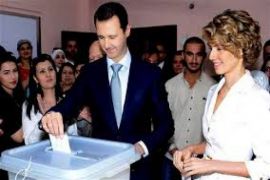Speaking at a press conference in The Hague after meeting Dutch counterpart Uri Rosenthal, Lavrov took a swipe at countries wanting to isolate President Bashar al-Assad`s regime which is accused of human rights abuses.
"Unfortunately some of our partners long ago wrote off the government of Syria," said Lavrov, whose country together with China vetoed a UN Security Council resolution earlier this month to condemn the violence in Syria.
"Instead of a dialogue there is an attempt to isolate the Syrian government."
Rosenthal sharply disagreed Wednesday, saying: "Let me be very frank. From the Dutch end we think the president of Syria should step down."
In Strasbourg, French Foreign Minister Alain Juppe said that Russia is the one that is isolating itself.
Lavrov said Moscow welcomed Assad`s decree ordering a referendum this month on a new constitution this month which would effectively end nearly 50 years of single party rule.
"We certainly believe a new constitution to end one-party rule in Syria is a step forward," Lavrov said, adding "it is a welcome idea and we hope the constitution will be adopted."
He said Russia continued to believe that Syrians should solve their problems through dialogue without external interference -- and only when both Assad`s regime and pro-democracy forces were involved.
Syria`s official SANA news agency earlier reported that Assad had issued a decree setting Sunday, February 26, as the date for the referendum, which would usher in a "new era" for Syria.
Under the new charter, freedom is "a sacred right" and "the people will govern the people" in a multi-party democratic system based on Islamic law, state television reported.
The proposed constitution does away with Article 8 of the old charter which declared the Baath Party, in power since 1963, as the "leader of the state and society."
Russia stands as one of the world`s last major friends of Assad, despite a barrage of criticism.
With the death toll from Damascus` vicious crackdown on protestors rising to over 6,000, Lavrov held direct talks with Assad in Damascus earlier this month, refusing to join growing calls on him to step down.
Although Lavrov`s mission was widely criticised by Arab nations and produced no tangible concessions, the Russian minister has cited it as an example for the need for further dialogue.
A new version of the Security Council resolution is due to be voted on in the UN General Assembly on Thursday and is expected to pass.
Russia and China are expected to oppose it but no one can veto resolutions in the 193-nation General Assembly, though they carry less weight.
"As far as the resolution is concerned, we prefer not to be guided by the fact that there is a resolution, we will be guided by the substance of (Thursday`s) resolution," Lavrov said.
"If the resolution is one-sided and ignores the fact that people are getting killed by the opposition armed group as well, then it will not be helpful," he added.
The resolution drawn up by Saudi Arabia and Qatar calls on Assad to halt deadly attacks on civilians, diplomats said.
It also expresses support for the Arab League`s plan to end the 11-month crackdown in Syria and calls for the naming of a UN special envoy.
Asked about Russia`s position on possible aid corridors into Syria, Lavrov said that the proposal would not fly unless it has the blessing of the Syrians themselves.
"I have not seen this proposal so I do not want to comment on it... but one thing is clear, all Syrian parties must agree to what has been proposed," said Lavrov, who went on to Vienna late Wednesday where he is due to meet his French counterpart on Thursday.
France first proposed the idea last November.
Ahead of their meeting, Juppe warned that Russia of isolation over its refusal to condemn Damascus and that he would try to convince Lavrov to change tack.
"I will tell him that Russia is isolating itself within the international community... and it is not a good thing for her to isolate herself to this extent," Juppe said.(*)
Editor: Heru Purwanto
Copyright © ANTARA 2012






